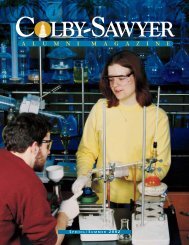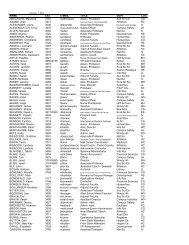Fall 2012 Issue - Colby-Sawyer College
Fall 2012 Issue - Colby-Sawyer College
Fall 2012 Issue - Colby-Sawyer College
Create successful ePaper yourself
Turn your PDF publications into a flip-book with our unique Google optimized e-Paper software.
The average food distribution<br />
facility puts around<br />
200,000 pounds of this<br />
product into a landfill every<br />
month.<br />
Pelech’s experiments<br />
resumed—this time in his<br />
own lab instead of his<br />
backyard. Finally, at two in<br />
the morning of another<br />
sleepless night, he and<br />
Mike Mooney ’02, Poly<br />
Recovery’s general manager,<br />
had what Pelech<br />
calls their eureka moment.<br />
They added a few more<br />
things to the baloney<br />
plastic—yogurt cups,<br />
shopping bags, stretch<br />
film, automotive bumpers<br />
—and were able to extrude<br />
a uniform product that<br />
is now used as a longerlasting<br />
alternative to<br />
petroleum-based rubber<br />
curb stops and speed<br />
bumps. Poly Recovery was<br />
poised on the cutting edge<br />
of recycling’s possibilities.<br />
Cradle to Grave<br />
to Cradle<br />
There are seven categories<br />
of plastic. Water and soda<br />
bottles are in category 1,<br />
and according to Pelech,<br />
America recycles them at a<br />
rate of 20 percent. Milk<br />
jugs and laundry detergent<br />
containers fall into<br />
category 2 and are hot<br />
commodities because they<br />
can be turned back into<br />
bottles, carpet, pipe or any<br />
number of products.<br />
Then there are the<br />
3-7s, a smorgasbord of<br />
polymers, and the majority<br />
of what fills America’s<br />
recycling bins.<br />
“Category 7 is the greatest<br />
challenge to recycling<br />
because it includes everything<br />
from dashboard<br />
plastic to bullet-proof<br />
glass, which is polycarbonate,”<br />
says Pelech. “Some<br />
of the items are worth<br />
huge money, but we send<br />
99 percent of them to Asia<br />
on container ships. They<br />
actually burn those plastics<br />
for fuel because it’s<br />
cheaper than oil and gives<br />
a higher BTU per dollar,<br />
which is a disaster.”<br />
Instead of letting plastics<br />
sail off to the other side<br />
of the planet or end up in a<br />
landfill because it “can’t”<br />
be recycled, Poly Recovery<br />
conducts recycling audits<br />
for businesses and looks<br />
for opportunities to turn<br />
their waste into new products.<br />
These days, manufacturers<br />
are calling on<br />
Pelech to recycle their<br />
paper and plastic waste at<br />
Poly Recovery with the<br />
promise that it will travel<br />
no more than 100 miles to<br />
be turned into a new<br />
product. With 100-plus<br />
clients, among them seven<br />
of the region’s 10 biggest<br />
manufacturers, it’s a<br />
promise that resonates<br />
with companies who<br />
are increasingly aware of<br />
sustainability issues<br />
and their impact on the<br />
local economy, and<br />
who don’t want to pay a<br />
trash hauler to dump<br />
their waste in a landfill.<br />
A resin that Poly Recovery<br />
produces, for example,<br />
goes into flower pots<br />
made in Massachusetts;<br />
paper and cardboard go<br />
to a partner in Fitchburg,<br />
Mass., and is turned into<br />
game boards and the<br />
backs of legal pads;<br />
another material travels<br />
11.8 miles down the road<br />
and is extruded into<br />
polyester fiber that is spun<br />
into car trunk liner and<br />
brand-name performance<br />
wear.<br />
“I’ve said it from the<br />
beginning, it’s our waste,”<br />
says Pelech. “Why do we<br />
want to ship it somewhere<br />
else? We created it. Let’s<br />
keep it here, let’s keep the<br />
jobs here. That adds so<br />
much more to our social<br />
and economic sustainability,<br />
never mind our environmental<br />
sustainability<br />
portion of it. We could<br />
make a hell of a lot more<br />
money if we just sent<br />
stuff to China, but I don’t<br />
want to do that. If I keep<br />
the stuff here I’m different<br />
from everyone else. We<br />
are plastics processors<br />
and we are good at it. We<br />
are damn good at it.”<br />
They are so good that<br />
Pelech is running a second<br />
shift and production line<br />
now; he expects nearly<br />
eight million pounds of<br />
waste to flow through Poly<br />
Recovery this year on its<br />
way to reincarnation.<br />
Early nights and enough<br />
sleep aren’t necessarily<br />
part of the future, though,<br />
because Pelech is running<br />
high on passion and is<br />
just getting started.<br />
“I’m working on<br />
Styrofoam next,” says<br />
Pelech. “It’s tough.<br />
The largest densified<br />
Styrofoam buyer is<br />
China. Let’s keep it all<br />
here. I don’t know why<br />
more people don’t<br />
do it. There should be a<br />
Poly Recovery every<br />
200 miles. That would<br />
mean no landfills…<br />
Imagine that!”<br />
Spring <strong>2012</strong><br />
57









